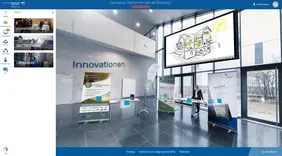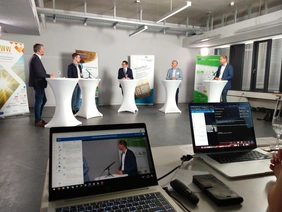Over 350 participants discuss new approaches for the heat transition during the digital conference.
From 2026 onwards, the installation of oil-based heating systems in Germany will be heavily regulated and only permitted in exceptional cases. With a new record of over 350 participants from all over Germany, the digital conference "What will follow oil-based heating?" took place last Wednesday, 16th of June 2021. The presentations and discussion focused on local heating networks and heat pumps as alternative heating options in rural areas. The conference was organised by the Institute of new Energy Systems (InES) at Technische Hochschule Ingolstadt (THI).
The conference was held digitally and therefore a special online platform was set up. In this online platform, participants were able to follow the lectures and the panel discussion via a live stream, further explore individual topics in small groups and engage in a live laboratory tour. The President of THI, Prof. Walter Schober welcomed all participants. This welcoming speech was followed by opening words and a presentation of the project “Rural Energy Supply of the Future” (Ländliche Energieversorgung der Zukunft) by Prof. Markus Goldbrunner. Mr. Paul Waning from the German Heat Pump Association (Bundesverband Wärmepumpe e.V.) opened the series of presentations with his keynote speech, presenting the potential of heat pumps for the heating market and giving the participants an outlook on the importance of heat pumps for rural regions.
The following short presentations covered a wide spectrum of information on sustainable heating technologies. For example, Tobias Reum and Sebastian Muschik (InES) presented concepts for increasing the annual performance factor of heat pumps; Rudolf Ettl (Grammer Solar GmbH) talked about solar heating and ventilation based on heating systems with air collectors and Dr. Andreas Wimmer (varmeco GmbH & Co. KG) explained how untapped heat can be harvested with the help of the "exergiemaschine" (exergy machine).
In the afternoon session, Mr. Andreas Wasem from the Federal Office of Economics and Export Control (BAFA) opened the second part of the conference and presented the federal government's funding opportunities for efficient heating networks. After numerous questions from the participants, the second round of presentations began with short presentations on the development of low-temperature heating networks (Niels Alter - C.A.R.M.E.N e.V.), a presentation of the "LowEX heating network serving the electricity grid" (Markus Euring - ENERPIPE GmbH) and an overview of alternative local heating concepts for new and existing buildings (Michael Westermaier - ratiotherm GmbH & Co. KG). The series of lectures was concluded by the presentation of Mr. Thilo Jungkunz (belence energy GmbH), who explained innovative ways of energy transition in municipal and regional heat supply.
The concluding panel discussion was facilitated by Dr. Mathias Ehrenwirth (Head of the InES research area Building Energy Systems), during which Paul Waning, Niels Alter, Thilo Jungkunz and Markus Euring discussed the topic of "Heat networks or heat pumps - which replaces oil heating?". It became clear that rural areas generally offer good conditions for heat networks and heat pumps. However, for widespread acceptability of these technologies, it is necessary to have financial support structures that allow actors early planning and innovative approaches. On a technical level, the switching from oil heating to heat pumps and/or heat networks also requires a holistic view on buildings and local conditions. This will be important to create the best possible conditions for the heat transition in rural areas, for example through upstream renovation measures or the integration of waste heat potentials.
The event was organised within the framework of the project "Rural Energy Supply of the Future", which is funded by the European Regional Development Fund and the Free State of Bavaria.
Further information on the symposium (lecture documents and recording of the live stream) can be found on the page of the Kompetenzzentrum Wärme&Wohnen (in German).
Further information on this project can be found at: www.laendliche-energieversorgung.de



![[Translate to English:] Logo Akkreditierungsrat: Systemakkreditiert](/fileadmin/_processed_/2/8/csm_AR-Siegel_Systemakkreditierung_bc4ea3377d.webp)








![[Translate to English:] Logo IHK Ausbildungsbetrieb 2023](/fileadmin/_processed_/6/0/csm_IHK_Ausbildungsbetrieb_digital_2023_6850f47537.webp)


